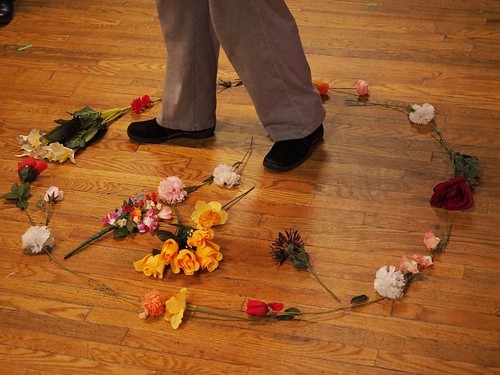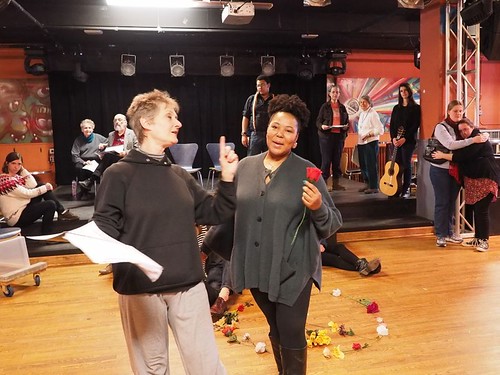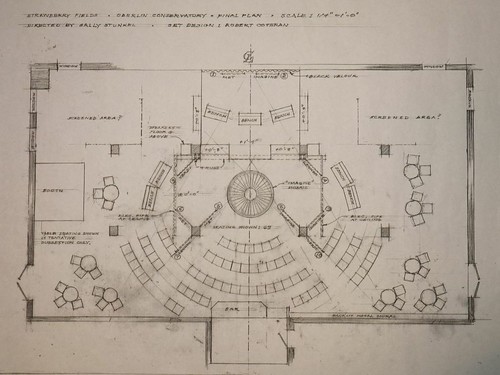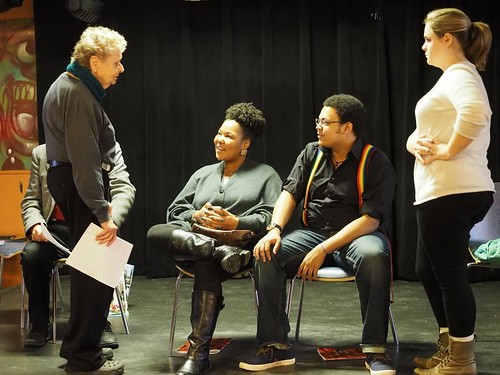
Behind the scenes at Oberlin Opera Theater
››› January 29, 2015 | Posted By Daniel McGrew
This month, Oberlin Opera Theatre presents a Winter Term double-bill of Menotti's The Telephone and Torke's Strawberry Fields.
Performances are Friday, January 30th at 8:00pm and Saturday, January 31st at 2:00 pm. All performances presented at the 'Sco, in the basement of WIlder
Michael Torke's Strawberry Fields is the story of an elderly woman with dementia who mistakes a bench in Central Park's Strawberry Fields for her seat at the opera. Director Sally Stunkel (SS), Musical Director Dan Michalak (DM), and tenor Josh Blue (JB), sat with me in an empty 'Sco, just before one of their final rehearsals, to discuss the process of selecting, preparing, and presenting Torke's opera.
How did you choose Strawberry Fields?
SS: Each year there's a chicken or the egg problem -- do we find a venue, pick apiece or pick a piece, find a venue...? But Dan thew some things at me... and we decided on the 'Sco.
DM: I either found the score in the library or the CD. I knew Michael Torke, but I didn't really realize.... I thought, wow! This is an immediately attractive score. It's accessible and a reasonable length, it seems cast-able, and I liked it.
SS: The first time I heard it, I was really taken by it. And I went on to listen to other things, but I kept coming back to Strawberry Fields.
Is it a unique experience preparing a modern piece, something so outside the standard repertoire?
DM: To say it's a modern piece is perhaps misleading, given what most people probably assume that means. If you look him up, you'll probably find, "Michael Torke -- post minimalism." Which is not to me a very helpful or meaningful designation. It's true, his style is very tonal, there's a lot of rhythmic ingenuity in it. But it doesn't sound like Steve Reich or anything. There are very conventionally beautiful arias for the Student and the Old Lady, right at the beginning of the opera. And Sally will attest to that any given night one of us is having trouble getting to sleep because we have some particularly catchy part of it in our head.
SS: Every. Single. Night.
JB: For me vocally, it hasn't been a difficult piece. Rhythmically is how it's been challenging. I learned this piece more aurally than I learn most things. I didn't sit down and read the score, I listened to it a bunch of times. And this helped me to feel the rhythms more clearly.
You're presenting Strawberry Fields in partnership with Kendal at Oberlin. What is the nature of this collaboration and how did it come to be?
SS: My mom was there, at Kendal. She died last year of Alzheimers. And so that's something I wanted to... not address. But one of the connections I had. Kendal was wonderful. And so when we chose this piece, I got in touch with them. I told them about the piece and asked if they'd be interested in helping us out with the dementia aspect of it and the nursing aspect. It started to really grow. First I was invited to a two hour lecture on Alzheimers and dementia presented by an expert by the name of Teepa Snow. I was blow away by how much I didn't know about it. And she also talked about dealing with people with dementia. And how not to deal with them -- how people mistakenly get in their faces, you know, and they correct them and, "No, Mom, it's not this way." None of that works. There's a completely different way of approaching these people. Which is something I had to learn the hard way.
So we agreed that we'd do a number of things. They would supply us with information about Alzheimers, dementia, nursing, and so on. And as it turns out one of those most amazing partnerships has been with our set designer Robert Cothran. He's a retired set designer living at Kendal, and he agreed to help us with this. Working with him has been an absolute joy.
JB: I've really enjoyed working with Kendal, too. I's not something I necessarily expected to be able to do during my time at Oberlin. And It's interesting because I didn't grow up with grandparents, so I've never had elderly people in my life, and I don't really know how to communicate or work with them, so to be able to talk with Kendal community members at rehearsal and to visit Kendal has been very rewarding.
SS: Early on -- one of our first trips to Kendal -- I brought Josh and Amber Monroe, who plays the Old Lady, to Kendal and sent them off with different people. And I kept looking, you know, where's Josh? And he spent, I don't know, a whole hour just talking with this woman. It was really marvelous.
JB: She was great; she had quite a story.
SS: It was perfect because Josh's character, the Student, sort of just knows how to interact with the Old Woman. He's drawn to her so naturally.
JB: Yes, he's a very positive character.
SS: Very upbeat. One of those people who really loves life.
DM: We also have a few Kendal community members singing in the chorus. And we have Allan Huszti. He's only been at Kendal a few years, but he recently retired from teaching voice at Sweet Briar College. And he's got a lovely baritone, singing the role of Workman at the beginning of the piece. He made a point of coming up to me yesterday to express what a pleasure it's been for him to perform again.
If I can ask what Strawberry Fields is about, beyond plot points, what would you say?
DM: Despite all the research we've done and the partnership with Kendal and all that, the piece itself is not a 40 minute public service announcement about Alzheimers. And I don't even think that the librettist, A. R. Gurney, who is a very famous playwright, was approaching it as trying to create some medically accurate portrait of these symptoms. It's more trying to dramatize this issue of what really constitutes quality of life for this person, who gets to decide that, and how do you figure out what that is.
SS: When the Old Lady talks to the Student at one point, she talks about taking a trip together. And it has to be a trip about music. And they compare the two great composers: Giuseppe Verdi and John Lennon. He introduces her to Lennon, she introduces him to Verdi. Eventually she says, "I love Lennon," and he says, "I Love Verdi." It's like they're saying they love each other.
JB: And the chorus comments that music is the magnet that brings everyone together. It's interesting because the love in this show is different from the love you get it most operas. But it is a love story.
SS: It's a love story.
Oberlin College & Conservatory | 77 W College Street, Oberlin, Ohio 44074 | 440-775-8200 | Directories | Search





Responses To This Entry:
Leave A Comment: